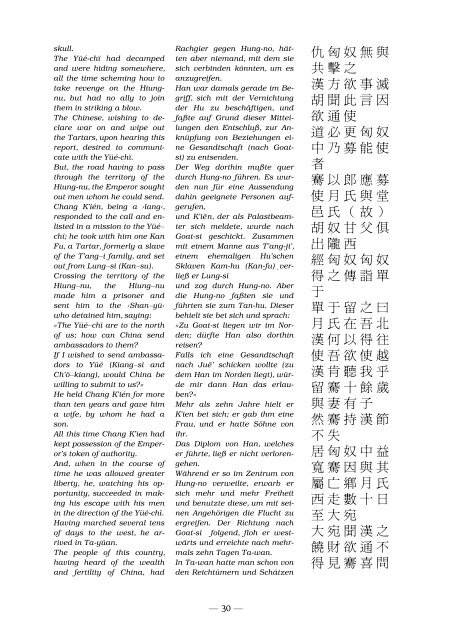張騫 Zhang Qian. The Secret Envoy of Han Emperor Wu in Search of the Arsi (Yuezhi) and the Fall of the Græco-Bactrian Kingdom. (Annotated Compilation of Eastern and Western Sources)
The study undertakes: — to clarify in what year Zhang Qian reached the Oxus river; to establish that the Daxia 大夏 in Shiji 123 represent the Tachar/Tochar of Tochar-i-stan; to explain how we are to understand the "List of Four" in Strabon 11.8.2.
The study undertakes: —
to clarify in what year Zhang Qian reached the Oxus river;
to establish that the Daxia 大夏 in Shiji 123 represent the Tachar/Tochar of Tochar-i-stan;
to explain how we are to understand the "List of Four" in Strabon 11.8.2.
Create successful ePaper yourself
Turn your PDF publications into a flip-book with our unique Google optimized e-Paper software.
skull.<br />
<strong>The</strong> Yüé-chï had decamped<br />
<strong>and</strong> were hid<strong>in</strong>g somewhere,<br />
all <strong>the</strong> time schem<strong>in</strong>g how to<br />
take revenge on <strong>the</strong> Hiungjo<strong>in</strong><br />
nu, but had no ally to<br />
<strong>the</strong>m <strong>in</strong> strik<strong>in</strong>g a blow.<br />
<strong>The</strong> Ch<strong>in</strong>ese, wish<strong>in</strong>g to de-<br />
clare war on <strong>and</strong> wipe out<br />
<strong>the</strong> Tartars, upon hear<strong>in</strong>g this<br />
report, desired to communi-<br />
<strong>of</strong> <strong>the</strong><br />
cate with <strong>the</strong> Yüé-chï.<br />
But, <strong>the</strong> road hav<strong>in</strong>g to pass<br />
through <strong>the</strong> territory<br />
Hiung-nu, <strong>the</strong> <strong>Emperor</strong> sought<br />
out men whom he could send.<br />
Chang K’ién, be<strong>in</strong>g a ›lang‹,<br />
responded to <strong>the</strong> call <strong>and</strong> en-<br />
Yüé–<br />
listed <strong>in</strong> a mission to <strong>the</strong><br />
chï; he took with him one Kan<br />
Fu, a Tartar, formerly a slave<br />
<strong>of</strong> <strong>the</strong> T’ang–i family, <strong>and</strong> set<br />
out from Lung–si (Kan–su).<br />
Cross<strong>in</strong>g <strong>the</strong> territory <strong>of</strong> <strong>the</strong><br />
Hiung–nu, <strong>the</strong> Hiung–nu<br />
made him a prisoner <strong>and</strong><br />
sent him to <strong>the</strong> ›Shan–yü‹<br />
who deta<strong>in</strong>ed him, say<strong>in</strong>g:<br />
»<strong>The</strong> Yüé–chï are to <strong>the</strong> north<br />
<strong>of</strong> us; how can Ch<strong>in</strong>a send<br />
ambassadors to <strong>the</strong>m?<br />
If I wished to send ambassadors<br />
to Yüé (Kiang–si <strong>and</strong><br />
Ch’ö–kiang), would Ch<strong>in</strong>a be<br />
will<strong>in</strong>g to submit to us?«<br />
He held Chang K’ién for more<br />
than ten years <strong>and</strong> gave him<br />
a wife, by whom he had a<br />
son.<br />
All this time Chang K’ien had<br />
kept possession <strong>of</strong> <strong>the</strong> <strong>Emperor</strong>’s<br />
token <strong>of</strong> authority.<br />
And, when <strong>in</strong> <strong>the</strong> course <strong>of</strong><br />
time he was allowed greater<br />
liberty, he, watch<strong>in</strong>g his opportunity,<br />
succeeded <strong>in</strong> mak<strong>in</strong>g<br />
his escape with his men<br />
<strong>in</strong> <strong>the</strong> direction <strong>of</strong> <strong>the</strong> Yüé-chï.<br />
Hav<strong>in</strong>g marched several tens<br />
<strong>of</strong> days to <strong>the</strong> west, he arrived<br />
<strong>in</strong> Ta-yüan.<br />
<strong>The</strong> people <strong>of</strong> this country,<br />
hav<strong>in</strong>g heard <strong>of</strong> <strong>the</strong> wealth<br />
<strong>and</strong> fertility <strong>of</strong> Ch<strong>in</strong>a, had<br />
Rachgier gegen Hung-no, hät-<br />
sie<br />
ten aber niem<strong>and</strong>, mit dem<br />
sich verb<strong>in</strong>den könnten,<br />
um es<br />
anzugreifen.<br />
<strong>Han</strong> war damals gerade im Be-<br />
der Hu zu beschäftigen, und<br />
griff, sich mit der Vernichtung<br />
faßte auf Grund dieser Mittei-<br />
ei-<br />
lungen den Entschluß, zur Anknüpfung<br />
von Beziehungen<br />
ne Ges<strong>and</strong>tschaft (nach Goatsi)<br />
zu entsenden.<br />
Der Weg dorth<strong>in</strong> mußte quer<br />
durch Hung-no führen. Es wurden<br />
nun für e<strong>in</strong>e Aussendung<br />
dah<strong>in</strong> geeignete Personen aufund<br />
K’i¥n, der als Palastbeam-<br />
gerufen,<br />
ter sich meldete, wurde nach<br />
Goat-si geschickt. Zusammen<br />
mit e<strong>in</strong>em Manne aus T’ang-ji’,<br />
e<strong>in</strong>em ehemaligen Hu’schen<br />
Sklaven Kam-hu (Kan-fu)verließ<br />
er Lung-si<br />
und zog durch Hung-no. Aber<br />
die Hung-no faßten sie und<br />
führten sie zum Tan-hu. Dieser<br />
behielt sie bei sich und sprach:<br />
»Zu Goat-si liegen wir im Nor-<br />
den; dürfte <strong>Han</strong> also dorth<strong>in</strong><br />
reisen?<br />
<strong>Fall</strong>s ich e<strong>in</strong>e Ges<strong>and</strong>tschaft<br />
nach Ju¥’ schicken wollte (zu<br />
dem <strong>Han</strong> im Norden liegt), würde<br />
mir dann <strong>Han</strong> das erlauben?«<br />
Mehr als zehn Jahre hielt er<br />
K’ien bei sich; er gab ihm e<strong>in</strong>e<br />
Frau, und er hatte Söhne von<br />
ihr.<br />
Das Diplom von <strong>Han</strong>, welches<br />
er führte, ließ er nicht verlorenvon<br />
gehen.<br />
Während er so im Zentrum<br />
Hung-no verweilte, erwarb er<br />
sich mehr und mehr Freiheit<br />
und benutzte diese, um mit se<strong>in</strong>en<br />
Angehörigen die Flucht zu<br />
ergreifen. Der Richtung nach<br />
Goat-si folgend, floh er westwärts<br />
und erreichte nach mehrmals<br />
zehn Tagen Ta-wan.<br />
In Ta-wan hatte man schon von<br />
den Reichtümern und Schätzen<br />
仇 匈 奴 無 與<br />
共 擊 之<br />
漢 方 欲 事 滅<br />
胡 聞 此 言 因<br />
欲 通 使<br />
道 必 更 匈 奴<br />
中 乃 募 能 使<br />
者<br />
騫 以 郎 應 募<br />
使 月 氏 與 堂<br />
邑 氏 ( 故 )<br />
胡 奴 甘 父 俱<br />
出 隴 西<br />
經 匈 奴 匈 奴<br />
得 之 傳 詣 單<br />
于<br />
單 于 留 之 曰<br />
月 氏 在 吾 北<br />
漢 何 以 得 往<br />
使 吾 欲 使 越<br />
漢 肯 聽 我 乎<br />
留 騫 十 餘 歲<br />
與 妻 有 子<br />
然 騫 持 漢 節<br />
不 失<br />
居 匈 奴 中<br />
益<br />
寬 騫 因 與 其<br />
屬 亡 鄉 月 氏<br />
西 走 數 十 日<br />
至 大 宛<br />
大 宛 聞 漢 之<br />
饒 財 欲 通 不<br />
得 見 騫 喜 問<br />
— 30 —


